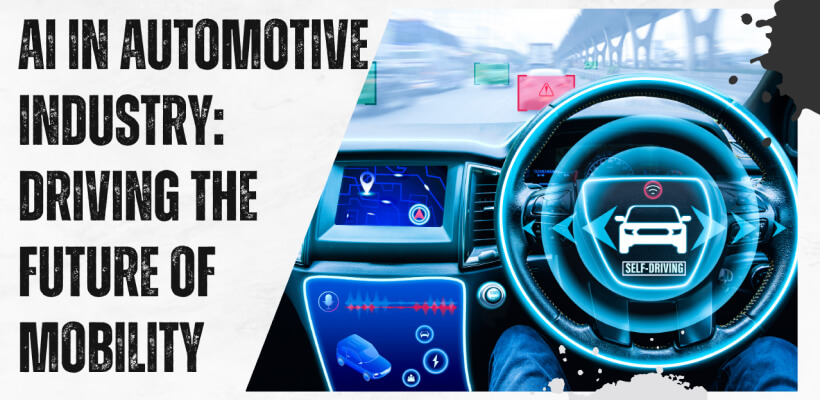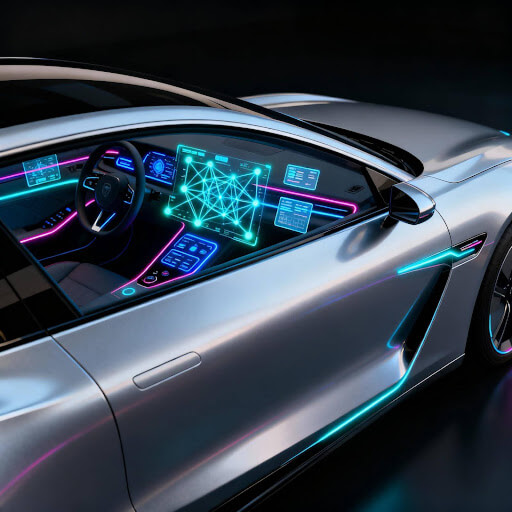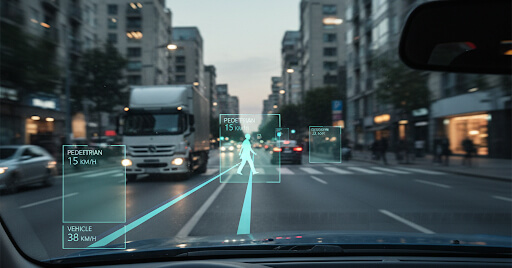 1-800-805-5783
1-800-805-5783 
The automotive world is in the midst of its most profound transformation since the invention of the assembly line. This revolution isn’t being forged in steel, but in silicon and software.
Artificial intelligence has shifted from a futuristic concept to the core engine driving innovation, efficiency, and experience across the entire sector. The automotive world is in the midst of its most profound transformation since the invention of the assembly line, driven primarily by the rapid integration of AI in the automotive industry.
The scale of this change is staggering; the global automotive AI market, valued at USD 4.29 billion in 2023, is projected to surge to an incredible USD 25.78 billion by 2030, growing at a compound annual growth rate (CAGR) of 29.2%.
This isn’t just an upgrade, it’s a complete reimagining of what a vehicle is and can be.
The pervasive influence of AI in the automotive industry is reshaping everything from the first design sketch to the ongoing relationship between a driver and their vehicle, truly defining the future of mobility.
The integration of AI in the automotive industry is a comprehensive overhaul, impacting every stage of the value chain.
This technological fusion is creating smarter, safer, and more personalized vehicles while simultaneously optimizing the complex processes required to build them.
For leaders and innovators in the space, understanding the multifaceted role of AI in the automotive industry is no longer a strategic advantage but a fundamental necessity for survival and growth.
As we explore this transformation, it becomes clear that AI is not just a feature; it is the foundational platform upon which the next generation of transportation will be built, fundamentally altering how we move through the world.

Long before a car hits the road, AI is hard at work. The role of AI in the automotive industry begins at the earliest stages of research and development, dramatically accelerating innovation cycles.
Traditionally, vehicle design involved years of painstaking physical prototyping and testing.
Today, AI-powered simulations allow engineers to test thousands of design variables in a virtual environment.
These algorithms can optimize a vehicle’s aerodynamics to reduce drag and improve fuel efficiency, fine-tune downforce for better handling, and even model airflow to minimize wind noise for a quieter cabin.
Generative AI models can propose novel design concepts by analyzing vast datasets to suggest structural improvements that enhance safety and performance, allowing engineers to explore a wider creative landscape in a fraction of the time.
This powerful synergy between human ingenuity and machine intelligence is a core tenet of modern AI in the automotive industry.
The factory floor has been transformed by the integration of AI in the automotive industry. Smart factories leverage AI to create a self-optimizing, highly efficient production environment.
The most visible impact of AI in the automotive industry is inside the vehicle itself. AI is transforming the car from a passive mode of transport into an intelligent, responsive, and personalized environment that acts as both a guardian and a concierge.
Safety is the paramount concern in mobility, and AI is the brain behind the most significant safety advancements in decades.
Advanced Driver-Assistance Systems (ADAS) use a suite of sensors, cameras, LiDAR, and radar to perceive the vehicle’s surroundings in real-time.
AI algorithms process this data to identify pedestrians, other cars, and road signs, enabling critical safety features like automatic emergency braking, lane-keeping assist, and adaptive cruise control.
This technology forms the foundation for fully autonomous driving. Companies like Tesla and Waymo are using sophisticated deep neural networks to navigate complex urban environments, predict the movement of other road users, and make split-second decisions to prevent accidents.
The continuous learning capabilities of these systems mean that the collective experience of the entire fleet makes every individual vehicle smarter and safer, highlighting the transformative potential of AI in the car industry.

Beyond safety, AI is making the driving experience more intuitive and enjoyable. The modern vehicle is becoming a deeply personalized space, thanks in large part to the power of AI in cars.
This level of intelligence relies on a network of connected devices, showcasing how the Internet of Things is impacting our daily lives.
While predictive and analytical AI have already made a massive impact, the next wave of transformation is being driven by a more advanced paradigm: agentic AI.
Unlike traditional AI that responds to commands, agentic AI in the automotive industry refers to autonomous systems that can understand high-level goals, break them down into steps, and execute complex tasks with minimal human oversight.
According to research from McKinsey, this technology has the potential to generate an additional $450 billion to $650 billion in annual revenue by 2030 in advanced industries like automotive.
This is where agentic AI is redefining efficiency and productivity on a whole new scale.
For example, one automotive supplier deployed a team of AI agents to automate the creation of complex software test cases, reducing the time required for specific tasks by a remarkable 50%.
The most compelling vision for agentic AI in connected cars is the self-maintaining vehicle.
Imagine your car not only detects an impending engine fault but also autonomously diagnoses the specific issue, contacts your preferred service center, negotiates an appointment that fits your calendar, and pre-orders the necessary parts, all while you carry on with your day.
This shift from providing data to orchestrating solutions is the hallmark of the agentic revolution.
The rapid integration of AI in the automotive industry is not without its challenges.
As vehicles become more connected and autonomous, they also become more vulnerable to cybersecurity threats, making robust security a non-negotiable priority.
The vast amounts of data required to power these intelligent systems also raise critical questions about data privacy and regulatory compliance with standards like GDPR.
Successfully navigating this complex landscape requires a strategic approach, ensuring that security and privacy are built into AI systems from the ground up.
Managing the underlying infrastructure securely, for instance, through best practices, is paramount.
The impact of AI in the automotive industry is undeniable and continues to accelerate.
From optimizing the first stages of design to creating a self-maintaining, hyper-personalized vehicle, AI is the driving force behind the future of mobility.
This revolution is about more than just building better cars; it’s about creating entirely new transportation ecosystems and business models.
For leaders in the automotive industry, embracing this comprehensive digital transformation is the definitive roadmap to success in an increasingly intelligent, connected, and autonomous world.
The journey is complex, but with the right expertise and a clear vision, the road ahead is full of opportunity.
1. What are the main benefits of using AI in the automotive industry?
The main benefits of AI in the automotive industry are enhanced safety through driver-assistance systems, greater manufacturing efficiency, and a superior, personalized customer experience.
2. How does AI improve vehicle safety?
AI in the automotive industry improves safety by processing sensor data in real-time to identify hazards and enable features like automatic emergency braking and collision avoidance.
3. What is agentic AI in the automotive industry?
Agentic AI in the automotive industry refers to autonomous systems that can understand goals and execute complex tasks without human input, like a car scheduling its own maintenance.
4. How is AI used in car manufacturing?
AI in car manufacturing powers “smart factories” by accelerating design with simulations, predicting equipment failures, and using computer vision for automated quality control.
5. What are the main challenges facing the adoption of AI in the automotive industry?
The main challenges for AI in the automotive industry include ensuring robust cybersecurity, addressing data privacy concerns, and navigating complex regulations for autonomous systems
6. How is ai being used in the automotive industry?
AI is used to power advanced driver-assistance systems (ADAS) and develop autonomous driving, enabling vehicles to see and react to their surroundings. It also enhances the in-car experience through smart voice assistants and optimizes manufacturing with AI-powered robotics and predictive maintenance.
At [x]cube LABS, we craft intelligent AI agents that seamlessly integrate with your systems, enhancing efficiency and innovation:
Integrate our Agentic AI solutions to automate tasks, derive actionable insights, and deliver superior customer experiences effortlessly within your existing workflows.
For more information and to schedule a FREE demo, check out all our ready-to-deploy agents here.